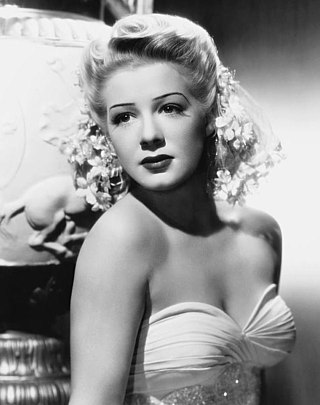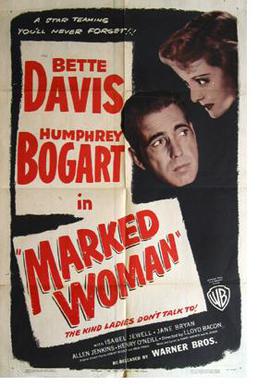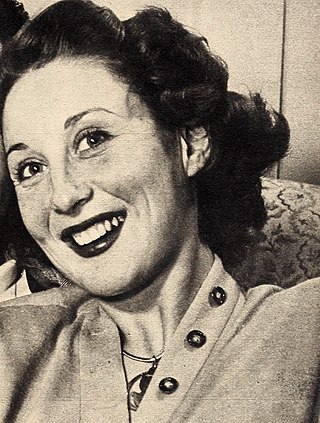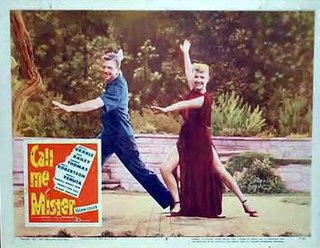Related Research Articles

Follies is a musical with music and lyrics by Stephen Sondheim and a book by James Goldman.

Elizabeth Ruth Grable was an American actress, pin-up girl, dancer, model and singer.

Evita is a musical with music by Andrew Lloyd Webber and lyrics by Tim Rice. It concentrates on the life of Argentine political leader Eva Perón, the second wife of Argentine president Juan Perón. The story follows Evita's early life, rise to power, charity work, and death.

Patti Ann LuPone is an American actress and singer best known for her work in musical theater. After starting her professional career with The Acting Company in 1972 she soon gained acclaim for her leading performances on the Broadway and West End stage. She has won three Tony Awards, two Olivier Awards, and two Grammy Awards, and was a 2006 inductee to the American Theater Hall of Fame.

The Phantom of the Opera is a musical with music by Andrew Lloyd Webber, lyrics by Charles Hart, additional lyrics by Richard Stilgoe and a libretto by Lloyd Webber and Stilgoe. Based on the novel of the same name by Gaston Leroux, it tells the tragic story of beautiful soprano Christine Daaé, who becomes the obsession of a mysterious but disfigured musical genius living in the subterranean labyrinth beneath the Paris Opéra House.

Betty Hutton was an American stage, film, and television actress, comedian, dancer, and singer. She rose to fame in the 1940s as a contract player for Paramount Pictures, appearing primarily in musicals and became one of the studio's most valuable stars. She was noted for her energetic performance style.

Betty Buckley is an American actress and singer. Buckley is the winner of a Tony Award, and was nominated for an additional Tony Award, two Daytime Emmy Awards, two Grammy Awards, and an Olivier Award. In 2012, she was inducted into the American Theater Hall of Fame.
Sunset Boulevard is a musical with music by Andrew Lloyd Webber, and lyrics and libretto by Don Black and Christopher Hampton. It is based on the 1950 film of the same title.

Marked Woman is a 1937 American dramatic crime film directed by Lloyd Bacon and starring Bette Davis and Humphrey Bogart, with featured performances by Lola Lane, Isabel Jewell, Rosalind Marquis, Mayo Methot, Jane Bryan, Eduardo Ciannelli and Allen Jenkins. Set in the underworld of Manhattan, Marked Woman tells the story of a woman who dares to stand up to one of the city's most powerful gangsters.

Michael Damian Weir is an American actor, recording artist, and producer, best known for his role as Danny Romalotti on the soap opera The Young and the Restless, which he played from 1981 to 1998, 2002 to 2004, 2008, 2012 to 2013, and again from 2022 to 2024.

42nd Street is a 1933 American pre-Code musical film directed by Lloyd Bacon, with songs by Harry Warren (music) and Al Dubin (lyrics). The film's numbers were staged and choreographed by Busby Berkeley. It stars an ensemble cast of Warner Baxter, Bebe Daniels, George Brent, Ruby Keeler, Dick Powell and Ginger Rogers.
Call Me Madam is a Broadway musical written by Howard Lindsay and Russel Crouse, with music and lyrics by Irving Berlin.

Fifty Million Frenchmen is a musical comedy with a book by Herbert Fields and music and lyrics by Cole Porter. It opened on Broadway in 1929 and was adapted for a film two years later. The title is a reference to the hit 1927 song "Fifty Million Frenchmen Can't Be Wrong" by Willie Raskin, Billy Rose, and Fred Fisher, which compared free attitudes in 1920s Paris with censorship and prohibition in the United States. The musical's plot is consistent with the standard boy-meets-girl plots of musical comedies of the first half of the twentieth century.

Betty Garrett was an American actress, comedian, singer and dancer. She originally performed on Broadway, and was then signed to a film contract with Metro-Goldwyn-Mayer. She appeared in several musical films, then returned to Broadway and made guest appearances on several television series.

The Cradle Will Rock is a 1937 play in music by Marc Blitzstein. Originally a part of the Federal Theatre Project, it was directed by Orson Welles and produced by John Houseman. Set in Steeltown, U.S.A., the Brechtian allegory of corruption and corporate greed includes a panoply of social figures. It follows the efforts of Larry Foreman to unionize the town's workers and combat the powerful industrialist Mr. Mister, who controls the town's factory, press, church, and social organization. The piece is almost entirely sung-through, giving it many operatic qualities, although Blitzstein included popular song styles of the time.

By Jeeves, originally Jeeves, is a musical with music by Andrew Lloyd Webber, and lyrics and book by Alan Ayckbourn. It is based on the series of novels and short stories by P. G. Wodehouse that centre around the character of Bertie Wooster and his loyal valet, Jeeves.

The Color Purple is a musical with music and lyrics by Brenda Russell, Allee Willis, and Stephen Bray, based on the 1982 novel The Color Purple by Alice Walker and its 1985 film adaptation. The musical follows the journey of Celie, an African American woman in the American South from the early to mid-20th century.
Jane Kean was an American actress and singer whose career in show business spanned seven decades and included appearing in nightclubs, on recordings, and in radio, television, Broadway and films. Among her most famous roles were as Trixie Norton on The Jackie Gleason Show, and as the voice of Belle in the perennial favorite Mister Magoo's Christmas Carol.
An album musical is a type of recording that sounds like an original cast album but is created specifically for the recording medium and is a complete entertainment product in itself, rather than just promoting or reflecting an existing or planned musical theatre production or revue. Although there has been no one term consistently used to describe this type of recording, the genre predates the use of the term "concept album" by several decades, dating back to the era of 78-rpm records with such original works as Gordon Jenkins' Manhattan Tower, The Letter, (1959) starring Judy Garland, and Stan Freberg's Stan Freberg Presents the United States of America, Volume One: The Early Years (1961). On most contemporary concept albums, the performers or bands sing as themselves, whereas on an album musical the performers are playing characters in a story.

Call Me Mister is a 1951 American Technicolor musical film released by Twentieth Century-Fox. The feature was directed by Lloyd Bacon and re-written from the 1946 Broadway play version by Albert E. Lewin and Burt Styler with music by Harold Rome that featured cast members from the US armed forces.
References
- ↑ "Discogs.com". Discogs.com. Retrieved April 25, 2021.